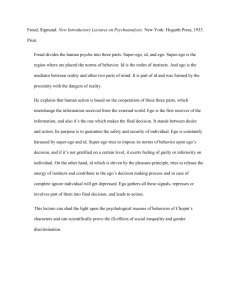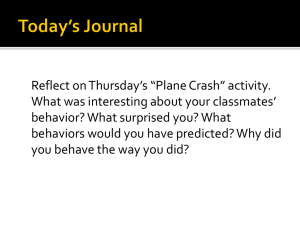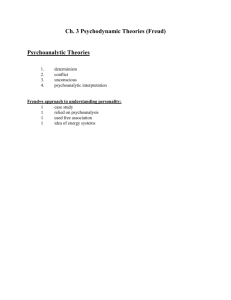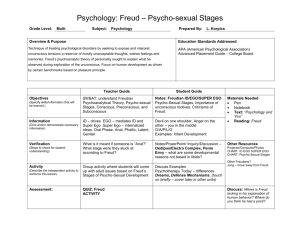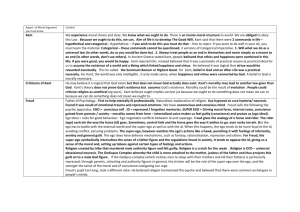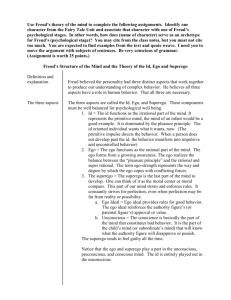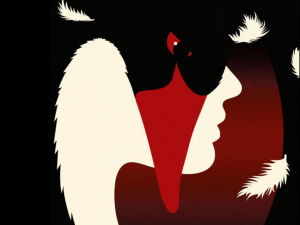Freud`s Battles of the Human Mind Critics like to base their
advertisement
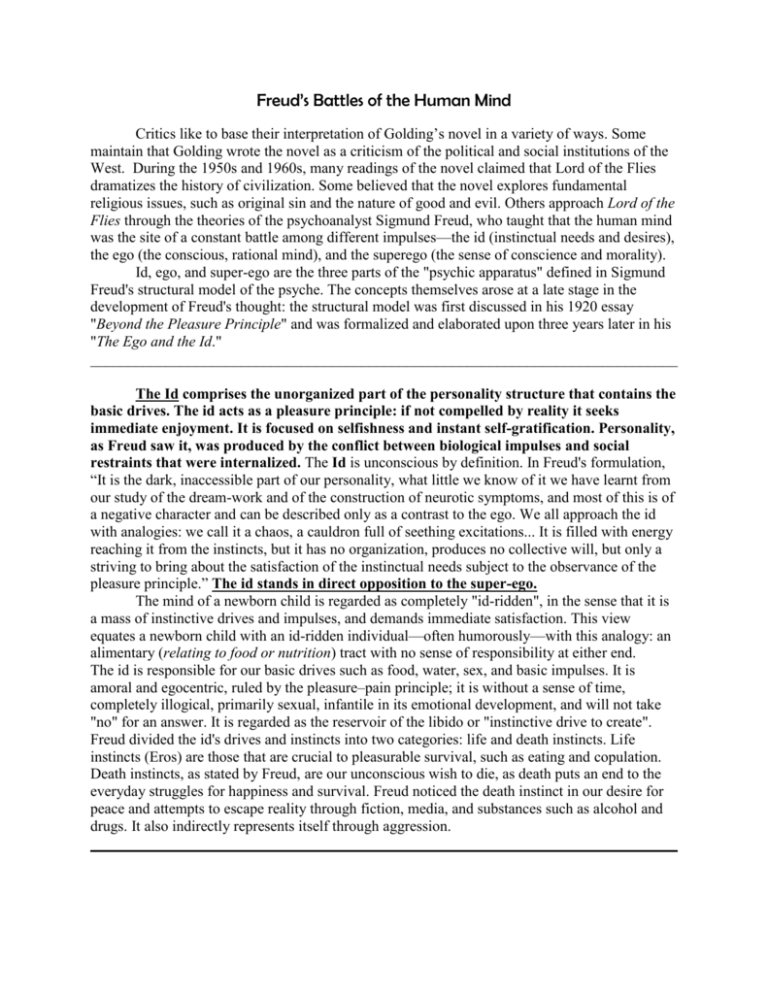
Freud’s Battles of the Human Mind Critics like to base their interpretation of Golding’s novel in a variety of ways. Some maintain that Golding wrote the novel as a criticism of the political and social institutions of the West. During the 1950s and 1960s, many readings of the novel claimed that Lord of the Flies dramatizes the history of civilization. Some believed that the novel explores fundamental religious issues, such as original sin and the nature of good and evil. Others approach Lord of the Flies through the theories of the psychoanalyst Sigmund Freud, who taught that the human mind was the site of a constant battle among different impulses—the id (instinctual needs and desires), the ego (the conscious, rational mind), and the superego (the sense of conscience and morality). Id, ego, and super-ego are the three parts of the "psychic apparatus" defined in Sigmund Freud's structural model of the psyche. The concepts themselves arose at a late stage in the development of Freud's thought: the structural model was first discussed in his 1920 essay "Beyond the Pleasure Principle" and was formalized and elaborated upon three years later in his "The Ego and the Id." ______________________________________________________________________________ The Id comprises the unorganized part of the personality structure that contains the basic drives. The id acts as a pleasure principle: if not compelled by reality it seeks immediate enjoyment. It is focused on selfishness and instant self-gratification. Personality, as Freud saw it, was produced by the conflict between biological impulses and social restraints that were internalized. The Id is unconscious by definition. In Freud's formulation, “It is the dark, inaccessible part of our personality, what little we know of it we have learnt from our study of the dream-work and of the construction of neurotic symptoms, and most of this is of a negative character and can be described only as a contrast to the ego. We all approach the id with analogies: we call it a chaos, a cauldron full of seething excitations... It is filled with energy reaching it from the instincts, but it has no organization, produces no collective will, but only a striving to bring about the satisfaction of the instinctual needs subject to the observance of the pleasure principle.” The id stands in direct opposition to the super-ego. The mind of a newborn child is regarded as completely "id-ridden", in the sense that it is a mass of instinctive drives and impulses, and demands immediate satisfaction. This view equates a newborn child with an id-ridden individual—often humorously—with this analogy: an alimentary (relating to food or nutrition) tract with no sense of responsibility at either end. The id is responsible for our basic drives such as food, water, sex, and basic impulses. It is amoral and egocentric, ruled by the pleasure–pain principle; it is without a sense of time, completely illogical, primarily sexual, infantile in its emotional development, and will not take "no" for an answer. It is regarded as the reservoir of the libido or "instinctive drive to create". Freud divided the id's drives and instincts into two categories: life and death instincts. Life instincts (Eros) are those that are crucial to pleasurable survival, such as eating and copulation. Death instincts, as stated by Freud, are our unconscious wish to die, as death puts an end to the everyday struggles for happiness and survival. Freud noticed the death instinct in our desire for peace and attempts to escape reality through fiction, media, and substances such as alcohol and drugs. It also indirectly represents itself through aggression. ______________________________________________________________________________ The Ego acts according to the reality principle; i.e. it seeks to please the id’s drive in realistic ways that will benefit in the long term rather than bringing grief. The Ego comprises that organized part of the personality structure which includes defensive, perceptual, intellectual-cognitive, and executive functions. Conscious awareness resides in the ego, although not all of the operations of the ego are conscious. The ego separates what is real. It helps us to organize our thoughts and make sense of them and the world around us. According to Freud, “...The ego is that part of the id which has been modified by the direct influence of the external world ... The ego represents what may be called reason and common sense, in contrast to the id, which contains the passions ... in its relation to the id it is like a man on horseback, who has to hold in check the superior strength of the horse; with this difference, that the rider tries to do so with his own strength, while the ego uses borrowed forces.” Freud, The Ego and the Id (1923) The ego is the mediator between the id and the super-ego, trying to ensure that the needs of both the id and the super-ego are satisfied. It is said to operate on a reality principle, meaning it deals with the id and the super-ego; allowing them to express their desires, drives and morals in realistic and socially appropriate ways. It is said that the ego stands for reason and caution, developing with age. Sigmund Freud had used an analogy which likened the ego to a rider and a horse; the ego being the rider while the id being the horse. The horse provides the energy and the means of obtaining the energy and information needed, while the rider ultimately controls the direction it wants to go. However, due to unfavorable conditions, sometimes the horse makes its own decisions over the rocky terrain. ______________________________________________________________________________ The Super-ego aims for perfection. It comprises that organized part of the personality structure, mainly but not entirely unconscious, that includes the individual's ego ideals, spiritual goals, and the psychic agency (commonly called 'conscience') that criticizes and prohibits his or her drives, fantasies, feelings, and actions. “The Super-ego can be thought of as a type of conscience that punishes misbehavior with feelings of guilt. For example: having extra-marital affairs.” The Super-ego works in contradiction to the id. The Super-ego strives to act in a socially appropriate manner, whereas the id just wants instant self-gratification. The Super-ego controls our sense of right and wrong and guilt. It helps us fit into society by getting us to act in socially acceptable ways. The Super-ego's demands oppose the id’s, so the ego has a hard time in reconciling the two. Freud's theory implies that the super-ego is a symbolic internalization of the father figure and cultural regulations. The superego tends to stand in opposition to the desires of the id because of their conflicting objectives, and its aggressiveness towards the ego. ______________________________________________________________________________ As we move deeper into the text, it is up to you, the reader, to pick out elements from the text that seem to support this critical approach. If this is an allegory, which characters seem to represent to id, the ego, and the super-ego? What reasons will you be able to use to support your claim?
